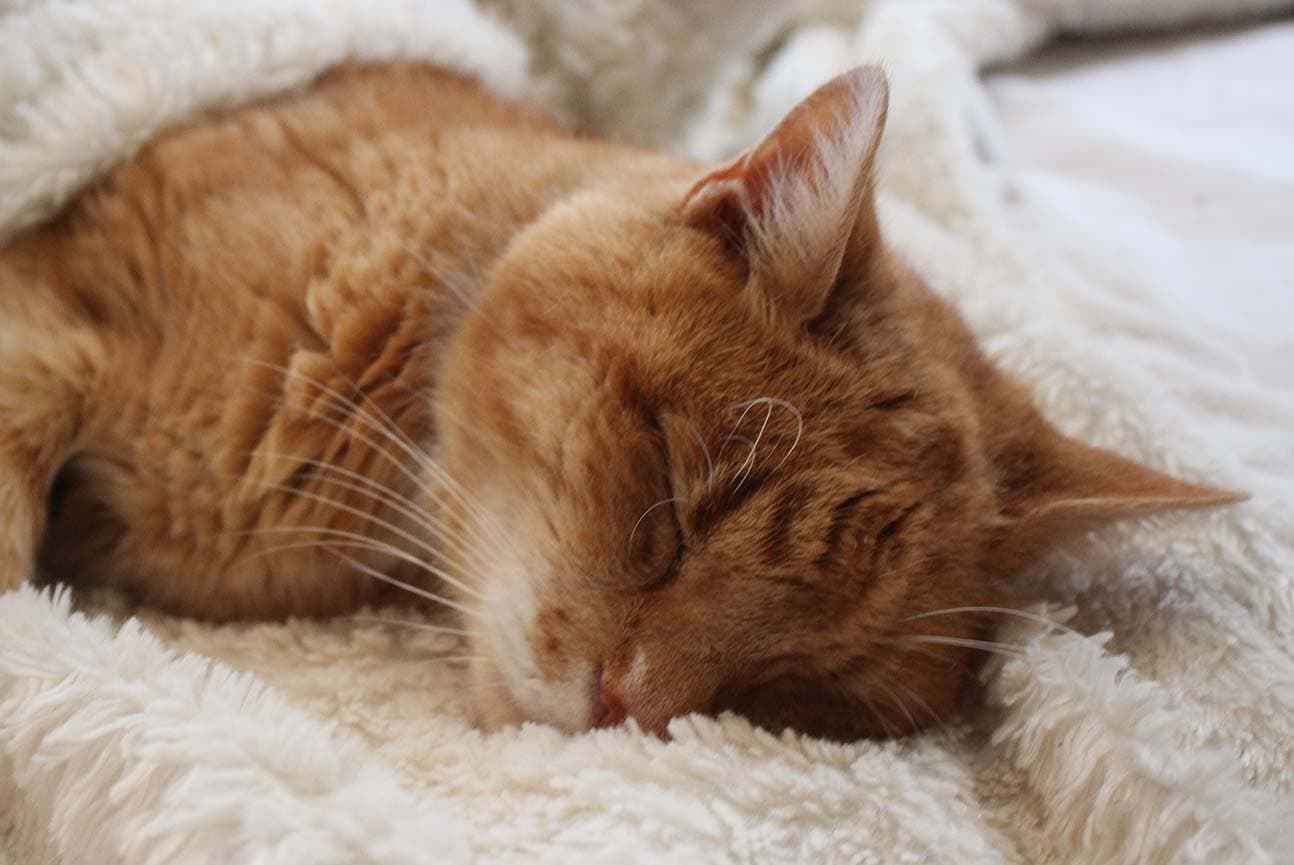Reviewed by Dr. Ionut Rusu
Updated on 23/10/2025
Reading time 4 min.
Overview
Severity: Low
Life stage: All
Lethargy in cats refers to unusually low energy and can range from mild tiredness to serious health problems. In Dubai’s hot climate, common causes include dehydration and heat stress, though other medical issues may also be involved. Signs include reduced activity, sleeping more than usual, reluctance to eat or play, and general listlessness. If lethargy persists for over 24 hours or appears severe, seek veterinary care immediately.
What to do if your cat is lethargic
Physical examination checklist:
- Check your cat for any new lumps, swellings, wounds or changes in the way they stand or move around
- Examine your cat’s gums if possible: They should be pink and moist. White or yellow gums indicate serious disease
- Check for unexplained weight loss or loss in body condition
- Note any changes in posture or mobility
- Observe whether they are grooming more than usual or in one particular area
Monitoring vital signs:
- Measure water intake carefully: dehydration occurs rapidly in Dubai’s heat
- Watch for increased drinking or urination (peeing), which may signal kidney disease or diabetes
- Monitor changes in appetite, stools (poo), or whether your cat is vomiting
- Observe breathing patterns for any changes: count how many breaths per minute when your cat is resting; each rise and fall of the chest is one breath
When to act
Contact a veterinary professional immediately if your cat shows severe lethargy. If the lethargy is mild but persists for more than 24 hours, you should still reach out to a vet. Prompt diagnosis and treatment often lead to better outcomes.
The most common causes of lethargy in cats
The warm Dubai climate creates specific risk factors, in addition to common medical causes.
Environmental factors:
- Heat stress and dehydration, especially during the summer months, when temperatures exceed 40°C
- Indoor lifestyle leading to inadequate environmental enrichment and boredom
- Vitamin D deficiency from limited sun exposure
- Obesity: common in Dubai’s sedentary indoor cats
- Stress from environmental changes, moving house or new pets
Infections and fever:
- Cat flu, urinary tract infections and bite abscesses from territorial disputes
- Fever accompanying infections, particularly problematic in warm conditions
- Bacterial or viral infections affecting multiple body systems, including FIV and FeLV
Pain-related causes:
- Arthritis, especially in older cats
- Wounds or injuries from fights or accidents
- Dental disease and oral (mouth) pain
- Internal injuries or recovering from surgery
Serious medical conditions:
- Kidney disease (increasingly common, possibly linked to chronic mild dehydration)
- Liver disease
- Gastrointestinal problems, including vomiting and diarrhoea
- Heart disease and cardiac conditions
- Hormonal disorders, such as diabetes and hyperthyroidism
- Anaemia and blood clotting disorders
Medication and toxin-related:
- Certain medications: antihistamines, steroids, anxiety treatments
- Recent vaccinations, especially primary courses in kittens
- Poisoning: rat bait, xylitol, chocolate, human medications
- Exposure to household chemicals or plants
When you should be worried about lethargy in cats
Seek immediate veterinary care if your lethargic cat:
- Develops persistent vomiting or can’t keep any food down
- Is losing weight rapidly
- Has gums that appear white or yellow
- Is having difficulty breathing or rapid breathing
- Refuses to eat anything for more than 24 hours
- Is straining to pass urine
Tips on how to prevent lethargy in cats
Medical prevention:
- Keep vaccinations up to date to protect against infectious diseases
- Use regular parasite preventatives against ticks, mites, worms, and other parasites; even indoor cats are at risk
- Neuter your cat to reduce fighting and associated bite abscesses
- Schedule regular veterinary check-ups for early identification of any problems
- Maintain dental health with regular cleaning
Environmental management for the Dubai climate:
- Keep your home consistently air-conditioned, especially during the hottest summer months
- Ensure constant access to fresh, cool water, with multiple bowls or cat water fountains throughout your home
- Provide adequate environmental enrichment for indoor cats
- Create cool resting areas away from direct sunlight
- Monitor indoor temperature and humidity levels
Nutrition and lifestyle:
- Feed high-quality, balanced cat food and avoid fatty treats
- Keep your cat at a healthy weight and body condition to prevent obesity-related lethargy
- Store all medications and human foods safely away from curious cats
- Consider joint supplements for older cats to manage arthritis
- Provide regular exercise opportunities through interactive play
How to know if your cat is lethargic
Recognising lethargy can be challenging since cats naturally sleep 12-14 hours daily. In Dubai’s heat, cats may sleep even more during daylight hours. Look for changes from your cat’s normal behaviour patterns:
Physical signs:
- Reluctance to go outside (even onto covered balconies)
- Slower movement than usual
- Difficulty jumping onto furniture or climbing
Behavioural changes:
- Hiding instead of seeking attention
- Disinterest in normal activities like playing or grooming
- Sleeping significantly more than usual
- Lack of interest in favourite treats or toys
Assessment tips:
Dubai’s indoor lifestyle means many cats have limited activity anyway. Subtle behavioural changes become more significant. Compare current behaviour to your cat’s normal patterns.
Trust your instincts. You know your cat’s personality best; don’t hesitate to call your vet if you are concerned.
How to treat a lethargic cat at home
Always consult a veterinarian before attempting home treatment, as lethargy can indicate serious health concerns.
Immediate care steps:
- Encourage water intake by providing fresh, cool water in multiple locations
- Use wide, shallow bowls to encourage drinking
- Allow rest in the coolest, quietest part of your home, away from heat sources
- Create comfortable resting areas with soft bedding, away from noise and other pets or children
Feeding support:
- Encourage eating by warming food slightly to release tempting aromas
- Offer small, frequent, bland meals if advised by your vet
- Try different textures or flavours to stimulate appetite
- Hand-feed if necessary to encourage intake
Monitoring requirements:
- Monitor appetite, vomiting, and bowel movements carefully
- Keep a log of symptoms and behaviours
Important warnings:
- Never use human medications on your cat; many are poisonous to cats
- Don’t delay professional care for persistent lethargy lasting over 24 hours
- Dubai’s heat makes dehydration particularly dangerous, requiring prompt attention
Vet treatment for lethargy in cats
Physical examination includes:
- Temperature measurement to check for fever
- Abdominal palpation for pain or abnormal masses
- Heart and lung evaluation, including heart rate measurement
- Oral (mouth) examination for dental disease
Important information to provide to your vet:
- Recent travel history (particularly relevant for Dubai’s international cat population)
- Any medication your cat may have taken (intentional or otherwise) or environmental changes
- Any contact with abnormal substances
- Timeline of the symptom’s development
Diagnostic tests may include:
- Blood tests: checking general health, hydration, and organ function
- Urine analysis to assess kidney function and detect infections or crystals
- Imaging: X-rays, ultrasound, CT, or MRI for internal evaluation
- Biopsy of abnormal masses, if present
Treatment options depend on the underlying cause:
- Hospitalisation for monitoring and intravenous fluids (via a drip)
- Antibiotics to target bacterial infections
- Pain relief and anti-inflammatory medications
- Gastric (stomach) protectants for digestive upsets
- Supportive care, including nutritional support
- Surgery or specific medications as required
Are some cats more at risk of developing lethargy than others?
Any cat can become lethargic at some time in their lives, but certain factors increase the risk:
Lifestyle factors:
- Outdoor cats face higher risks from fighting and infectious diseases
- Dubai’s extreme heat limits safe outdoor access for many pets
- Unvaccinated cats have increased susceptibility to infectious causes
- Cats without parasite prevention face risks from tick-borne diseases
Age-related risks:
- Older cats more commonly develop arthritis, kidney disease, and cancer
- Kittens are more susceptible to certain infections, parasites, and dehydration
Breed predispositions:
- Higher heart disease risks in: Maine Coons, Ragdolls, British Shorthairs, Persians, Siamese, Burmese, Sphinx, and Devon Rex
- Some breeds seem to be more prone to kidney disease: Persians, Abyssinians, Siamese, Ragdoll, Burmese, Russian Blue, and Maine Coon
Dubai-specific considerations:
- Cats with international travel history may carry exotic diseases
- Indoor cats may be more susceptible to obesity-related lethargy
- Cats not adapted to hot climates may struggle more with heat stress
Worried about your cat’s sudden tiredness or lack of energy? Book a checkup or emergency appointment today at Modern Vet Hospital in Dubai. Our experienced veterinary team can identify the cause of your cat’s lethargy. Whether it’s heat stress, dehydration or an underlying illness and provide the right treatment without delay. From routine health checks to urgent care, Modern Vet Hospital is your trusted partner in Dubai for complete, compassionate feline care.
Share this, choose your platform!
Reviewed by
Dr. Ionut Rusu
USAMV, RCVS
Dr. Ionut Rusu is a senior veterinarian with nearly a decade of successful experience in the field. He graduated in 2014 from the University of Agricultural Sciences and Veterinary Medicine (USAMV)…


